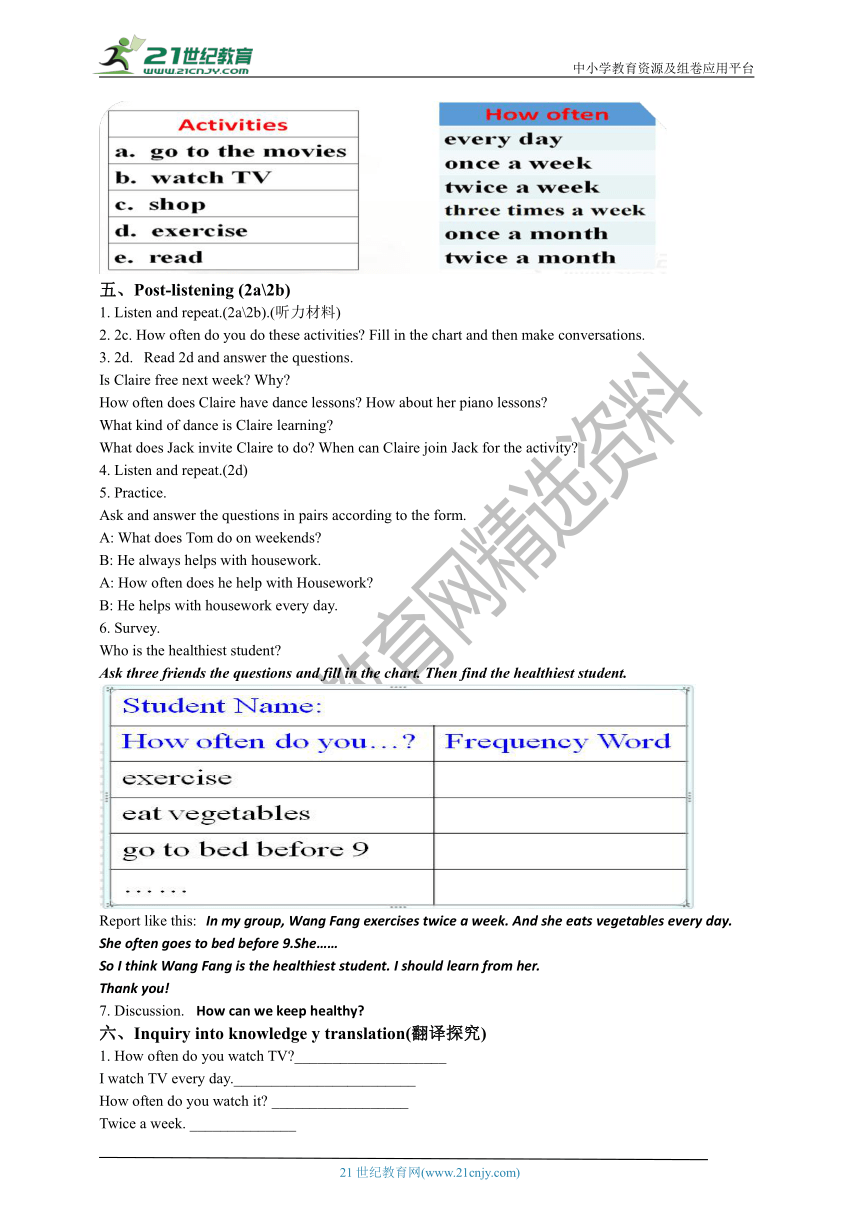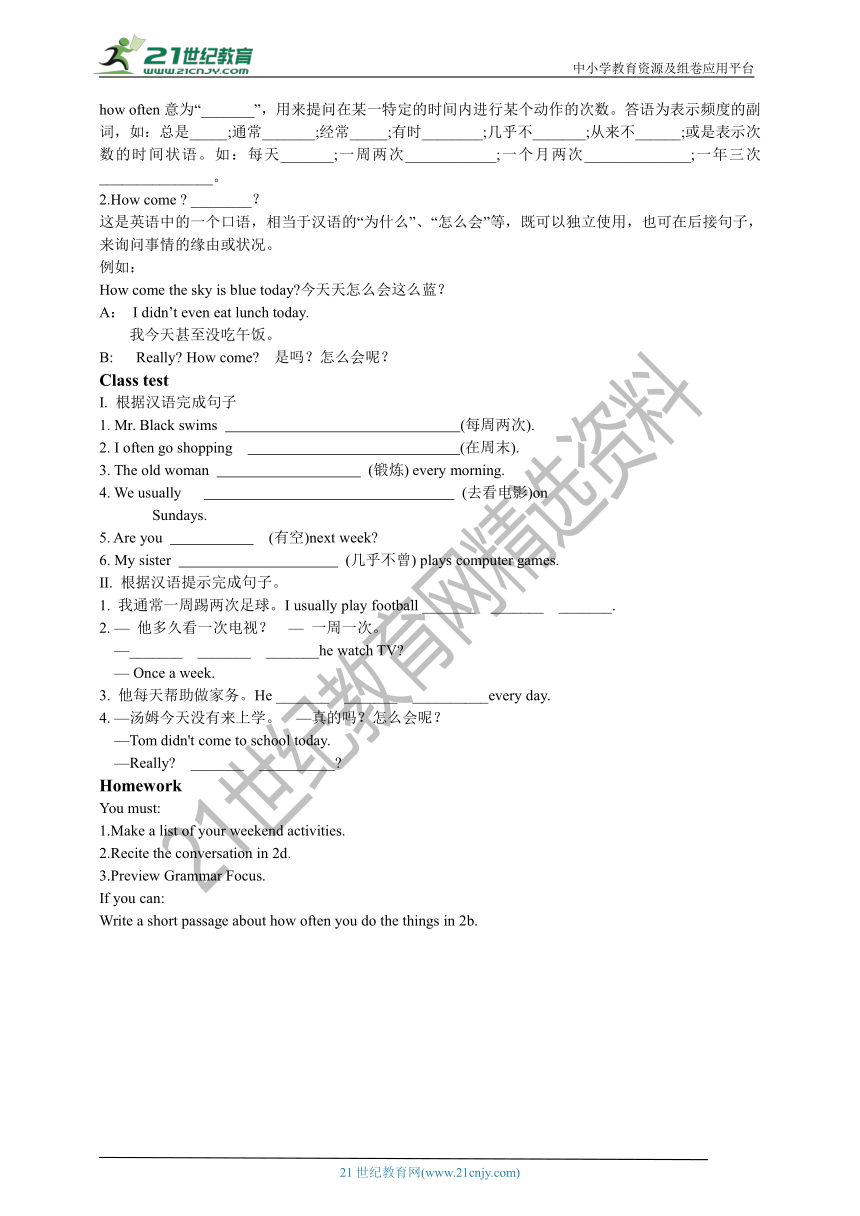(新课标)Unit2 How often do you exercise? SectionA 1a-2d 学案(含答案)
文档属性
| 名称 | (新课标)Unit2 How often do you exercise? SectionA 1a-2d 学案(含答案) |  | |
| 格式 | zip | ||
| 文件大小 | 1.6MB | ||
| 资源类型 | 试卷 | ||
| 版本资源 | 人教新目标(Go for it)版 | ||
| 科目 | 英语 | ||
| 更新时间 | 2022-09-06 11:09:15 | ||
图片预览




文档简介
中小学教育资源及组卷应用平台
Unit 2 How often do you exercise
Section A (1a-2d)学案
【学习目标】
1.学习本课新词汇:housework, hardly, ever, once, twice, Internet, program, full, swing, hardly ever, swing dance,help with housework, once a week, twice a week, use the Internet
掌握句型:
①— What do you do on weekends — I usually/always/often...
②—How often do you… —Twice a week/...
③—How come —I have...
2.通过角色扮演和真实情景中对话,正确地使用how often引导的特殊疑问句及频率副词询问、描述从事活动的频率。
3.通过听音配对、听音排序及连线相关活动,能准确地抓取关键词并正确地使用频率副词及短语。
4.借助2d活动,能够利用本单元的目标语言准确地表达日常活动安排,学会合理安排自己的活动,建立良好的生活观。
【学习过程】
一、Pre-listening
1. Warming up
What do you usually do on weekends
2. Practice.
What does(do) she / he /they usually do on weekends
3. Lead in.
A young reporter was interviewing six students about their weekends’ activities.
What are they doing
4. 1a. Look at the picture. Make a list of the weekend activities.
5.Presentation.
What do you do on weekends
always—总是, usually---通常 often ---- 经常,
sometimes---有时, hardly ever---很少,几乎不 , never---从不
观察与思考:你发现了什么?
I am always busy.
I usually watch TV.
I often play basketball.
I sometimes go to movies.
I hardly ever do housework.
He is never late for school.
结论:_______________________________________________________________________
_____________________________________________________________________________
6.Practice.
Let’s talk about the people in the pictures below.
What do they do on weekends
What does he do on weekends
What does she do on weekends
二、While-listening (1b)
1. Listen and write the activities next to the correct frequency words.
2. Listen again and complete the conversation, then repeat it.
Reporter: _____________________ on weekends
Girl 1: I ___________ go shopping.
Boy 1: I ______ go shopping. I ________ watch TV.
Boy 2: I _______ exercise.
Girl 2: I _______ help with housework.
Reporter: How about you
Girl 3: I ___________ watch TV. I ________read.
三、Post-listening (1b)
1. Reporter: What do you usually do on weekends
What does the girl/boy usually do one weekends
2. 1c. Practice the conversation in the picture above. Then make your own conversations about what you do on weekends.
四、Pre-listening(2a\2b)
1. Enjoy a video and answer the questions.
How often does the cat go fishing
How often does the bird go shopping
2. Presentation.
How often does she brush her teeth
______________________________
how often “多久一次”, 常用来询问某一动作或事情发生的频率。
答语有三种情况:
_____________________________________________________________________________________________________________________________________________________________________________________________________________________________________________________________________
3. Practice.
How often do you read books
How often__________________
How often _____ she go shopping
4. Practice.
How often do you have _________ class
We have ________ class __________.
两周一次 _______________ 一年两次 ________________一个月两次 ________________
四、While-listening (2a\2b)
1. 2a.Listen. Cheng is talking about how often he does different activities. Number the activities you hear.
Listen. Where did the people go on vacation Complete the chart.
2. 2b. Listen again. Match the activities in 2a with how often Cheng Tao does them.
五、Post-listening (2a\2b)
1. Listen and repeat.(2a\2b).(听力材料)
2. 2c. How often do you do these activities Fill in the chart and then make conversations.
3. 2d. Read 2d and answer the questions.
Is Claire free next week Why
How often does Claire have dance lessons How about her piano lessons
What kind of dance is Claire learning
What does Jack invite Claire to do When can Claire join Jack for the activity
4. Listen and repeat.(2d)
5. Practice.
Ask and answer the questions in pairs according to the form.
A: What does Tom do on weekends
B: He always helps with housework.
A: How often does he help with Housework
B: He helps with housework every day.
6. Survey.
Who is the healthiest student
Ask three friends the questions and fill in the chart. Then find the healthiest student.
Report like this: In my group, Wang Fang exercises twice a week. And she eats vegetables every day.
She often goes to bed before 9.She……
So I think Wang Fang is the healthiest student. I should learn from her.
Thank you!
7. Discussion. How can we keep healthy
六、Inquiry into knowledge y translation(翻译探究)
1. How often do you watch TV ____________________
I watch TV every day.________________________
How often do you watch it __________________
Twice a week. ______________
how often意为“_______”,用来提问在某一特定的时间内进行某个动作的次数。答语为表示频度的副词,如:总是_____;通常_______;经常_____;有时________;几乎不_______;从来不______;或是表示次数的时间状语。如:每天_______;一周两次____________;一个月两次______________;一年三次_______________。
2.How come ________?
这是英语中的一个口语,相当于汉语的“为什么”、“怎么会”等,既可以独立使用,也可在后接句子,来询问事情的缘由或状况。
例如:
How come the sky is blue today 今天天怎么会这么蓝?
A: I didn’t even eat lunch today.
我今天甚至没吃午饭。
B: Really How come 是吗?怎么会呢?
Class test
I. 根据汉语完成句子
1. Mr. Black swims (每周两次).
2. I often go shopping (在周末).
3. The old woman (锻炼) every morning.
4. We usually (去看电影)on
Sundays.
5. Are you (有空)next week
6. My sister (几乎不曾) plays computer games.
II. 根据汉语提示完成句子。
1. 我通常一周踢两次足球。I usually play football _______ _______ _______.
2. — 他多久看一次电视? — 一周一次。
—_______ _______ _______he watch TV
— Once a week.
3. 他每天帮助做家务。He _______ _______ __________every day.
4. —汤姆今天没有来上学。 —真的吗?怎么会呢?
—Tom didn't come to school today.
—Really _______ __________
Homework
You must:
1.Make a list of your weekend activities.
2.Recite the conversation in 2d.
3.Preview Grammar Focus.
If you can:
Write a short passage about how often you do the things in 2b.
学案答案:
六、Inquiry into knowledge y translation(翻译探究)
Class test
—、根据汉语完成句子
二、根据汉语意思完成句子
always(100%) _________________________
usually __________________________
often __________________________
sometimes ___________________________
hardly ever ___________________________
never ___________________________
21世纪教育网 www.21cnjy.com 精品试卷·第 2 页 (共 2 页)
HYPERLINK "http://www.21cnjy.com/" 21世纪教育网(www.21cnjy.com)
Unit 2 How often do you exercise
Section A (1a-2d)学案
【学习目标】
1.学习本课新词汇:housework, hardly, ever, once, twice, Internet, program, full, swing, hardly ever, swing dance,help with housework, once a week, twice a week, use the Internet
掌握句型:
①— What do you do on weekends — I usually/always/often...
②—How often do you… —Twice a week/...
③—How come —I have...
2.通过角色扮演和真实情景中对话,正确地使用how often引导的特殊疑问句及频率副词询问、描述从事活动的频率。
3.通过听音配对、听音排序及连线相关活动,能准确地抓取关键词并正确地使用频率副词及短语。
4.借助2d活动,能够利用本单元的目标语言准确地表达日常活动安排,学会合理安排自己的活动,建立良好的生活观。
【学习过程】
一、Pre-listening
1. Warming up
What do you usually do on weekends
2. Practice.
What does(do) she / he /they usually do on weekends
3. Lead in.
A young reporter was interviewing six students about their weekends’ activities.
What are they doing
4. 1a. Look at the picture. Make a list of the weekend activities.
5.Presentation.
What do you do on weekends
always—总是, usually---通常 often ---- 经常,
sometimes---有时, hardly ever---很少,几乎不 , never---从不
观察与思考:你发现了什么?
I am always busy.
I usually watch TV.
I often play basketball.
I sometimes go to movies.
I hardly ever do housework.
He is never late for school.
结论:_______________________________________________________________________
_____________________________________________________________________________
6.Practice.
Let’s talk about the people in the pictures below.
What do they do on weekends
What does he do on weekends
What does she do on weekends
二、While-listening (1b)
1. Listen and write the activities next to the correct frequency words.
2. Listen again and complete the conversation, then repeat it.
Reporter: _____________________ on weekends
Girl 1: I ___________ go shopping.
Boy 1: I ______ go shopping. I ________ watch TV.
Boy 2: I _______ exercise.
Girl 2: I _______ help with housework.
Reporter: How about you
Girl 3: I ___________ watch TV. I ________read.
三、Post-listening (1b)
1. Reporter: What do you usually do on weekends
What does the girl/boy usually do one weekends
2. 1c. Practice the conversation in the picture above. Then make your own conversations about what you do on weekends.
四、Pre-listening(2a\2b)
1. Enjoy a video and answer the questions.
How often does the cat go fishing
How often does the bird go shopping
2. Presentation.
How often does she brush her teeth
______________________________
how often “多久一次”, 常用来询问某一动作或事情发生的频率。
答语有三种情况:
_____________________________________________________________________________________________________________________________________________________________________________________________________________________________________________________________________
3. Practice.
How often do you read books
How often__________________
How often _____ she go shopping
4. Practice.
How often do you have _________ class
We have ________ class __________.
两周一次 _______________ 一年两次 ________________一个月两次 ________________
四、While-listening (2a\2b)
1. 2a.Listen. Cheng is talking about how often he does different activities. Number the activities you hear.
Listen. Where did the people go on vacation Complete the chart.
2. 2b. Listen again. Match the activities in 2a with how often Cheng Tao does them.
五、Post-listening (2a\2b)
1. Listen and repeat.(2a\2b).(听力材料)
2. 2c. How often do you do these activities Fill in the chart and then make conversations.
3. 2d. Read 2d and answer the questions.
Is Claire free next week Why
How often does Claire have dance lessons How about her piano lessons
What kind of dance is Claire learning
What does Jack invite Claire to do When can Claire join Jack for the activity
4. Listen and repeat.(2d)
5. Practice.
Ask and answer the questions in pairs according to the form.
A: What does Tom do on weekends
B: He always helps with housework.
A: How often does he help with Housework
B: He helps with housework every day.
6. Survey.
Who is the healthiest student
Ask three friends the questions and fill in the chart. Then find the healthiest student.
Report like this: In my group, Wang Fang exercises twice a week. And she eats vegetables every day.
She often goes to bed before 9.She……
So I think Wang Fang is the healthiest student. I should learn from her.
Thank you!
7. Discussion. How can we keep healthy
六、Inquiry into knowledge y translation(翻译探究)
1. How often do you watch TV ____________________
I watch TV every day.________________________
How often do you watch it __________________
Twice a week. ______________
how often意为“_______”,用来提问在某一特定的时间内进行某个动作的次数。答语为表示频度的副词,如:总是_____;通常_______;经常_____;有时________;几乎不_______;从来不______;或是表示次数的时间状语。如:每天_______;一周两次____________;一个月两次______________;一年三次_______________。
2.How come ________?
这是英语中的一个口语,相当于汉语的“为什么”、“怎么会”等,既可以独立使用,也可在后接句子,来询问事情的缘由或状况。
例如:
How come the sky is blue today 今天天怎么会这么蓝?
A: I didn’t even eat lunch today.
我今天甚至没吃午饭。
B: Really How come 是吗?怎么会呢?
Class test
I. 根据汉语完成句子
1. Mr. Black swims (每周两次).
2. I often go shopping (在周末).
3. The old woman (锻炼) every morning.
4. We usually (去看电影)on
Sundays.
5. Are you (有空)next week
6. My sister (几乎不曾) plays computer games.
II. 根据汉语提示完成句子。
1. 我通常一周踢两次足球。I usually play football _______ _______ _______.
2. — 他多久看一次电视? — 一周一次。
—_______ _______ _______he watch TV
— Once a week.
3. 他每天帮助做家务。He _______ _______ __________every day.
4. —汤姆今天没有来上学。 —真的吗?怎么会呢?
—Tom didn't come to school today.
—Really _______ __________
Homework
You must:
1.Make a list of your weekend activities.
2.Recite the conversation in 2d.
3.Preview Grammar Focus.
If you can:
Write a short passage about how often you do the things in 2b.
学案答案:
六、Inquiry into knowledge y translation(翻译探究)
Class test
—、根据汉语完成句子
二、根据汉语意思完成句子
always(100%) _________________________
usually __________________________
often __________________________
sometimes ___________________________
hardly ever ___________________________
never ___________________________
21世纪教育网 www.21cnjy.com 精品试卷·第 2 页 (共 2 页)
HYPERLINK "http://www.21cnjy.com/" 21世纪教育网(www.21cnjy.com)
同课章节目录
- Unit 1 Where did you go on vacation?
- Section A
- Section B
- Unit 2 How often do you exercise?
- Section A
- Section B
- Unit 3 I'm more outgoing than my sister.
- Section A
- Section B
- Unit 4 What's the best movie theater?
- Section A
- Section B
- Unit 5 Do you want to watch a game show?
- Section A
- Section B
- Unit 6 I'm going to study computer science.
- Section A
- Section B
- Unit 7 Will people have robots?
- Section A
- Section B
- Unit 8 How do you make a banana milk shake?
- Section A
- Section B
- Unit 9 Can you come to my party?
- Section A
- Section B
- Unit 10 If you go to the party, you'll have a grea
- Section A
- Section B
